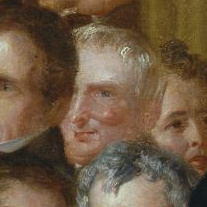Joseph Pease (India reformer) facts for kids

Joseph Pease (1772–1846) was an English activist and a member of the Quaker religious group. He was interested in many ways to make society better. Joseph Pease became very well known for his work with the British India Society. This group worked to end slavery and improve life in India.
Contents
About Joseph Pease
His Early Life and Family
Joseph Pease was born in 1772. His father, also named Joseph Pease, was a wool manufacturer in Darlington, England. Joseph had an older brother named Edward Pease, who was famous for his work with railways. Joseph followed his family into the wool business.
Sometimes people called him Joseph Pease of Feethams. It can be tricky because he is often confused with his nephew, Joseph Pease. His nephew was also named Joseph Pease and was the first Quaker to become a Member of Parliament.
Fighting for Change
Joseph Pease believed in many important causes. From 1815, he spoke out against the Corn Laws. These laws made food expensive for many people. In 1817, he helped start the Peace Society. This group worked to promote peace and prevent wars.
In the 1830s, Joseph Pease became very active in "India reform." This meant finding ways to stop the use of enslaved people in making goods like cotton. He also wanted to end slavery in India completely. He worked with speakers like George Thompson to share his ideas.
The British India Society
In 1839, Joseph Pease was a key person in starting the British India Society (BIS). This group worked to help India. One of its main goals was to encourage cotton farming in India. This would provide a different way to get cotton without using enslaved labor.
The BIS also wanted to work with moderate Chartists. These were people who wanted more rights for ordinary workers. The society also disagreed with some other anti-slavery groups. The British India Society was active for a few years, until about 1843.
Ending Slavery in India
Joseph Pease spoke at the World Anti-Slavery Convention in 1840. He openly said that the British government was allowing slavery to continue in India. He was a strong supporter of the Anti-Slavery Society. He wrote many articles for them in 1841 and 1842.
He even talked with Dwarkanath Tagore about a speech Tagore gave in 1842. Pease felt that Tagore's speech was too focused on military power. Thanks to the efforts of people like Joseph Pease, British laws made slavery illegal in India in 1843.
Pease and George Thompson also connected the British India Society with the Anti-Cornlaw League. They believed in free trade, which meant goods could be bought and sold without high taxes. Later, Joseph Pease became less critical of the East India Company. This happened after James Cosmo Melvill of the Company worked to improve their relationship.
His Family
Joseph Pease married Elizabeth Beaumont. She passed away in 1824. He then married Anne Bradshaw in 1831. Joseph had two children from his first marriage: John Beaumont Pease (1803–1873) and Elizabeth Pease Nichol.
 | Aurelia Browder |
 | Nannie Helen Burroughs |
 | Michelle Alexander |

